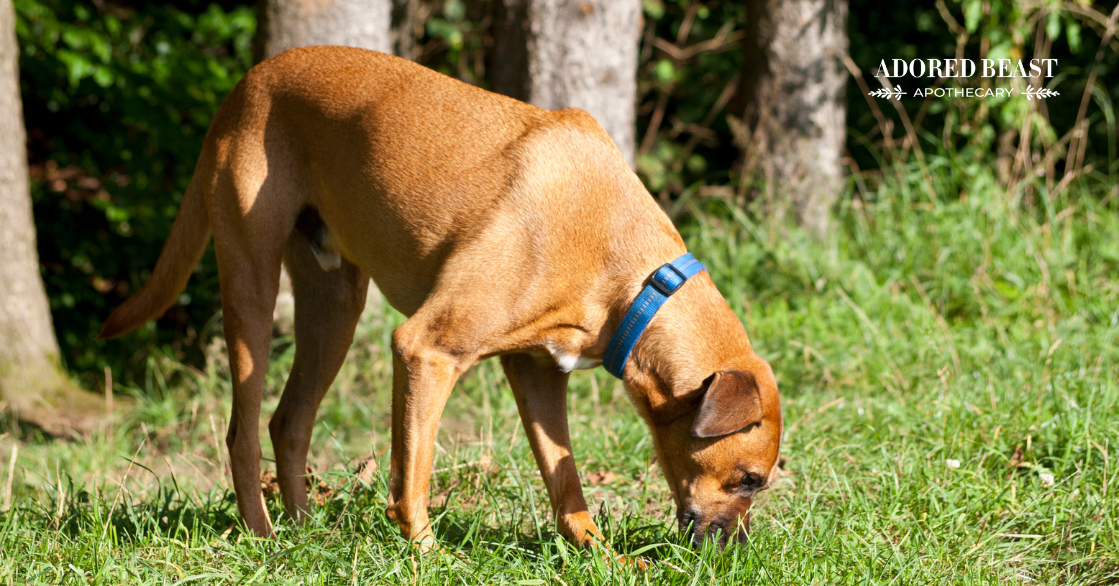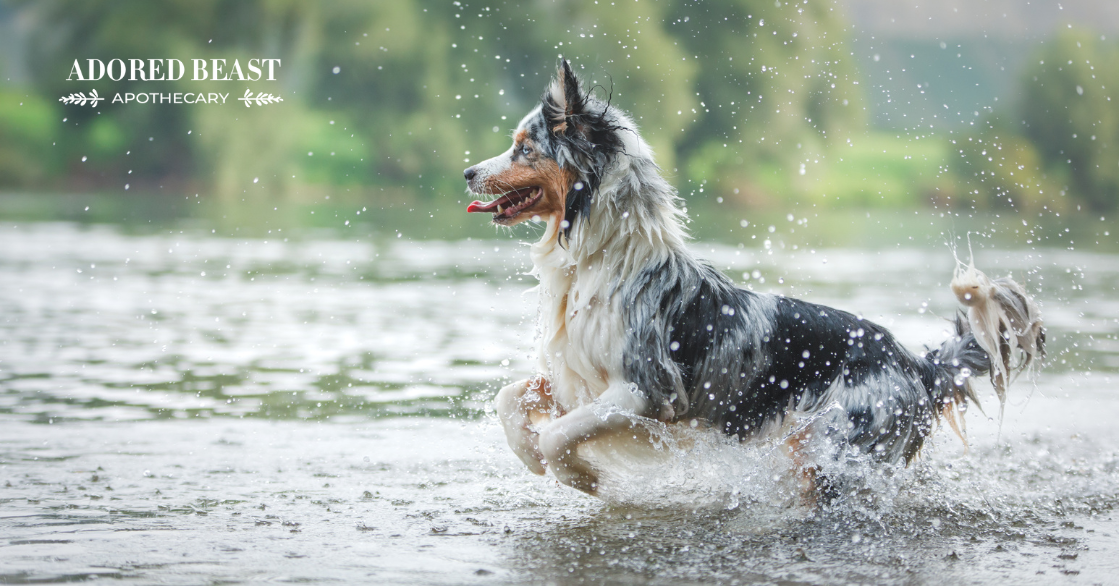Our dogs all do things that make us scratch our heads. They roll in dead things, sniff each other’s butts… eat their own (or other animals’) poop. These things are often less than appealing to pet parents – but some are more abnormal than others.
Poop eating, known scientifically as coprophagia, is common enough among dogs. Many dogs develop this habit, for one reason or another, much to the chagrin of their parents. Don’t worry – there’s no evidence to suggest it’s harmful to pet parents (although you probably want to limit the kisses after a poop snack attack)!
So why do dogs eat poop? Does it taste good? Is it a learned behaviour, or an indication of poor health?
It could be one of many reasons.
Why Do Dogs Eat Poop?
The act of poop eating is definitely a strange one. But dogs don’t tend to be averse to poop, so it isn’t that mind-boggling when you think about it.
That said, dogs don’t just eat poop for something to do – at least not in most cases. When it comes to poop eating, causes fall into two main categories: medical and behavioural. And while research into answering “why do dogs eat poop” is not extensive, and is based mostly on pet parent surveys, there tend to be similarities across all studies.
Medical Reasons for Poop Eating
1. Unbalanced Microbiome
If we look to nature, and how animals behave in the wild, we know that they often instinctively know what’s good for them. They turn to various herbs and medicinal plants to soothe their ailments, and allow that ancient wisdom to heal.
Now, our domestic animals don’t often have that luxury. But they still know when something is up – or in this case, off. And a microbiome that’s missing something is one reason dogs may eat poop. Fresh feces contain high levels of microbes that help repopulate the beneficial bacteria in the gut. If the gut is not balanced or has been traumatized by something like antibiotics, NSAIDs, or leaky gut is at play, then the body can’t fully digest food. In this case, dogs may be eating poop for the important beneficial microbes that may be left in the stool.
2. Enzyme Deficiency
Digestive enzymes assist in the digestive process, breaking down food and allowing your pet to gain nutrition from their food. Dogs make their own digestive enzymes, but they also get them from their food. And if they don’t get enough, their digestion suffers. Additionally, if their food is highly processed then the limited time it is in a dog’s digestive system means much of the nutrient value goes straight through. Therefore, a dog may eat her own feces to try and get the nutrition she has lost.
Just as dogs may eat poop for the beneficial microbes, they may also eat it for the digestive enzymes. Since poop can be a good source of digestive enzymes, dogs with a deficiency will sometimes ingest the enzyme-rich poop of other animals (for example, rabbit poop).
Interesting to note is that a study done in 2018 found that 82.3% of frequent stool eaters ate kibble. This was based on a parent-response survey.
NOTE: Eating rabbit, squirrel, deer, horse, cow poop is very normal and in many situations often healthy in small doses in order to create the diversity in the microbiome of the gut! If your dog is eating healthy wild animal poop or healthy horse or cow manure now and then it could actually be a good thing and very, very, very normal!
[RELATED] Digestive Enzymes for Dogs: Do They Really Need Them?
Behavioural Reasons for Poop Eating
1. Mothers Eating Puppies’ Poop
For several weeks after puppies are born, mothers will eat their puppies’ feces, likely for hygienic purposes. Some believe this goes back to our dogs’ ancestors, and how wolves clean up after young puppies or older or sick wolves to protect the area around the den and leave it healthy for the entire pack. This behaviour is normal and speaks clearly to their intelligence and cleanliness when given the opportunity. This typically stops after puppies reach a certain age and isn’t typically in the coprophagia category. However, if the pet parent or breeder is not conscious of the size of the puppies’ pen or environment, this can last way too long. This is unhealthy for the mother to keep doing and for the puppies to not have the space to learn to move away from their eating and sleeping area to urinate or defecate.
2. Poop Punishment
Dogs who are punished for things like pooping in the house may develop a negative association with feces. As a result, they may convince themselves pooping itself is bad, so they hide the evidence by eating it.
3. Learned Behaviour
If a puppy sees an older dog eating their poop, or the poop of other dogs or animals, they may learn the behaviour and start eating it to. Monkey see, monkey do – or rather, doggie see, doggie do…
4. Hunger
Sadly, coprophagia tends to be more likely in puppy mill dogs, or those who go hungry. Because poop may have nutrients, and may be readily available, it makes sense to consume it.
5. Improper Crate Care
Dogs don’t like to poop where they sleep or spend most of their time. If a dog is kept in a crate for long periods of time without proper bathroom breaks, they may be forced to poop in their crate. And they don’t want to have their poop in there. Their best option, especially if they likely saw their mother do it, is to eat it to keep their space clean. Then it becomes habitual.
6. Camouflage
Sometimes, dogs take after their ancestors and eat poop as a sort of camouflage, or in an attempt to protect their territory. Predators will often roll in and consume the poop of other animals when hunting, in an attempt to mask their scent. Most dogs don’t need to mask their smells to hunt, but it could be an ancestral behaviour. On the other hand, occasionally a very timid dog may eat another dog’s stool in an attempt to remove the intruder’s “mark” from their own territory.
How to Stop The Feces Feasting
There are a few things that you can try to help stop feces feasting.
Obviously, the biggest would be picking up the poop as soon as possible. Accompanying your dog into the yard while they do their business and cleaning up after them can help stop them from eating it.
Discouraging the behaviour with commands like “leave it” may also be helpful. Or, if that doesn’t work (and it may not), try and distract them by saying look over here or let’s go this way, or throw a ball or a stick, then go pick up the poop.
Since food may be a contributing factor, particularly a lack of beneficial bacteria or digestive enzymes or poor bioavailability, sometimes altering the diet can curb poop eating. Switching to a species-appropriate diet and adding pre and probiotics and digestive enzymes to the diet can help to correct a digestive imbalance and stop the poop eating.
Are medications the answer? Several different food additives and medications exist that claim to be able to curb poop eating. With creative names like Dis-Taste, Stop Stool Eat, and Potty Mouth, there’s no question what these are for. However, a study that examined poop eating extensively determined that coprophagia appeared not to be meaningfully altered by any of the products.
In our opinion, no matter the reason, poop eating is a sign that something is going on that you need to sort out, physically or emotionally, so that things do not go into a deeper disease. We would highly recommend working with a holistic nutritionist on diet and supplements, and if that doesn’t help, seek out an animal homeopath to work on the emotional state of your dog. Our founder has worked with hundreds of dogs with coprophagia in her veterinary clinic with success in all cases.












